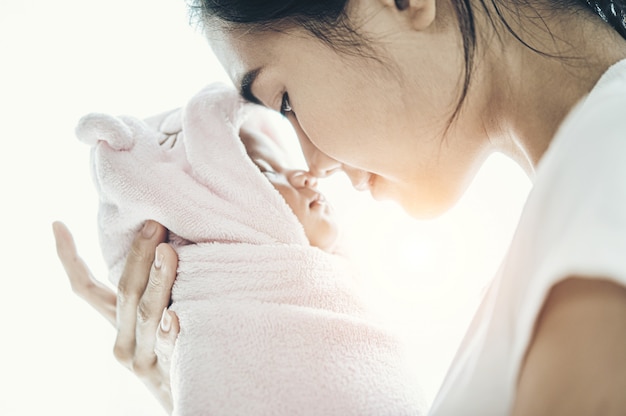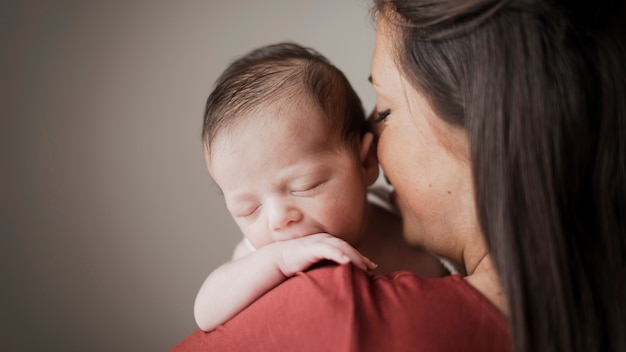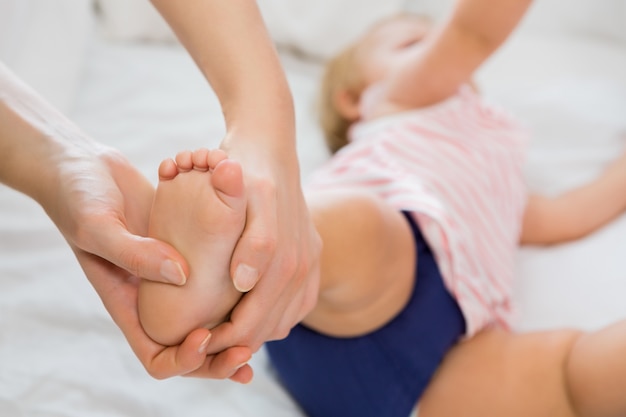Why after delivery care important in Ayurveda
A period after delivery to the commencement of the next menstruation this phase is called Sutik. It derived from the word Prsauta or the mother after delivery.
There is a different opinion of this period which ranges from six weeks to six months and some believe that it lasts until the restoration of the menstrual cycle.
The ninety days after delivery are considered vital cleansing recuperative periods which mother should take complete rest to regain strength and health of her pregnancy.
Ayurveda says 42 days for 42 years is the impact of choices immediately postpartum on health and ability to mother and partner well. Little things can make a big difference at this time.
Benefits of after delivery care
- Rejuvenate and relax the mother
- Relieve tension and depression
- Remove stretch marks
- Tighten loose stomach muscles
- Treatment for preventing hair fall
- Remove the post-natal back and joint pain
- Prevent wear and tear bone
- To restore the Agni (digestive fire)
- Normalize the Vata
- Optimize the quality of breast milk
Includes in care
- External treatment
- Internal medicine
- Aahar (diet)
- Vihar (lifestyle or physical activity)
- Vichar (mental activity)
External treatment
How to perform self-massage
- Choose your essential oils.
- Heat your massage oil.
- Messages begin with a small amount of oil, start message to the top of your head in a clockwise manner and on the center of your palm.
- This is the Marm (Vital) point and regulates the amount of Prana(air) that moves throughout the body.
- Next apply oil neck and arms.
- Remember circulation motion on join and long stroke on limb clockwise circular stroke on the breast area and abdominal area.
- Continue sequences on hip buttocks legs and end of feet.
- Take Hot water bath after the massage.
Belly binding with below benefits
The wrapping helps in compression of the abdomen and it avoids the presence of hollow space in the abdominal region.After taking a bath tummy is tied with a cotton sari or cloth or belt. It helps to get rid of stomach gas.
Promote healthy posture.
Covering the head
A new mother needs to preserve her body heat to recover. Covering your head is believed to keep you warm and protect you from infections.Internal medicine
Internal medicine starts after 5 days of Delivery
- After 5 Days:
- Start Panchkol Powder
- 1 tsp twice a day after lunch and dinner with Lukewarm water (Continue 7-9 Days).
- After 10 Days:
- Dashmoolarishta—30 ml with an equal amount of water (twice a day).
- Saubhagya Shunthi Pak- 10 gm with fresh warm milk after lunch and dinner (early in the morning).
- After One Month:
- Supari Pak -10 gm with fresh warm milk early in the morning.
Aahar (Postpartum diet)
Shri Charaka Samhita mentions a very liquid diet to be taken postpartum by the mother.
- First 3 -5 days light food is given which can promote energy.
- Only boiled water is given for drinking.
- Yoush of yava and kulattha is given as easy to digestion.
- Shali rice is best.
Vata specifying diet for new mother
What to take
- Warm food and Drink
- Sweet and Salty Taste
- Moong daal and yellow moong daal is easy digestible
Dairy
- Whole milk is best for nursing mother especially warm milk with ghee. Take milk separately from lunch and dinner -for example, a glass mid-morning and mid-afternoon.
Oil and Ghee
Ghee is especially nourishing and settling to a new mother and help with digestion. Take one tablespoon per meal (added to vegetable and rice) and one tablespoon with warm milk morning and before bed.
Grains
Rice and wheat are best. Brown rice is too hard to digest for a new mother.
Vegetables
Spices
Diet food should be prepared with digestive spices such as turmeric, cumin, ginger salt, cinnamon, cardamom, small quantities of black pepper is suitable. The practice of using spices like ginger and garlic helps in the proper flow of lochia and helps the uterus to return his original size.
Nuts
Take only 4 -5 nut per day. Nuts are soaked and powdered to mix in milk consumed every day for the strength it is a stanya rasayan.
Avoid
- dry food, cold drinks, raw food cold food
- Potato cauliflower cabbage and okra should be avoided.
- Toor Daal as it causes the Gas problem
- Sour fruits, lemon, orange, pineapple, tomato, Curd. In India fruit is avoided for the first 21 days.
- Eating salad can cause constipation. Pungent, astringent or bitter taste.
Sample Diet plan
Early morning–tea with dry fruits ladoo
Breakfast- vegetable Dalia
Lunch- lauki ki sabzi and Missi Roti
Evening- hot milk with dry fruits
Dinner -vegetable khichadi
Edible gum is mixed with dry fruits and make Ladoo these are given to mother after 20 days of delivery along with warm milk. It helps to normalize the reproductive organ.
Sample meal for lunch and dinner
First Day’s Rice Pudding
It favors iron-rich, energy-giving sweetness, oiliness, ample spicing and moisture.
Ingredient: 4 cups water, 1 cup basmati rice, dark, iron-rich sugar, ½ Cup ghee (sesame oil for vegans), 2/3 teaspoon cinnamon powder, ½ teaspoon clove powder, ½ teaspoon black pepper, 1/3 teaspoon saffron (or 2/3 teaspoon of turmeric), ½ teaspoon of cardamom powder.
Ingredient: 4 cups water, 1 cup basmati rice, dark, iron-rich sugar, ½ Cup ghee (sesame oil for vegans), 2/3 teaspoon cinnamon powder, ½ teaspoon clove powder, ½ teaspoon black pepper, 1/3 teaspoon saffron (or 2/3 teaspoon of turmeric), ½ teaspoon of cardamom powder.
- Rinse the rice 3 times under warm water
- Bring the water to a boil in a large, heavy-bottomed pot. Alternatively, fill the crockpot with water
- Add rice to the water and let the rice simmer without a lid, stirring occasionally for several hours.
- When beginning to thicken, add the sugar and all the spice powders.
- Add half of the ghee.
- Continue to cook slowly and stir as needed When consistency is gelatinous, stir in remaining ghee and serve hot.
New Mother’s Dal (as a thin, strongly spiced soup)
Ingredient: 1/3 Cup split peeled mung dal, 3 cups water, 2 Tablespoons ghee or sesame oil (if vegan), 1 teaspoon cumin seeds, 2 cloves of garlic, minced, 1 teaspoon fenugreek seeds, 2 Tablespoons finely chopped cilantro, ½ teaspoon black pepper, ¼ teaspoon turmeric, 1/3 teaspoon salt, 2 pinches cayenne pepper, ¼ teaspoon grated fresh ginger.
- Rinse mung dal and soak for 30 minutes
- Bring water to a boil and add the mung dal. Skim foam off the top and discard.
- Simmer for about 30-40 minutes
- Warm ghee in a small frying pan and add cumin and garlic. When they begin to brown, add fenugreek and stir until they are lightly toasted (they brown quickly).
- Add the cilantro, cayenne, and turmeric
Any well-cooked sweet whole grain porridge preparation (organic), could be oats, wheat, rice, etc. and should be sweet but not too astringent.
Ingredient: ½ cup grain of choice 2 cups water, or organic cow’s milk, as you prefer Cook grain in the water for 30–40 minutes. When liquid in consistency add the ingredients below.
Add:
- 1–2 tablespoons organic ghee
- 2 teaspoons organic whole sweeteners like maple syrup or organic sugar (unrefined)
- 1 teaspoon of each cardamom, cinnamon, and ginger
- 2–3 dates, chopped
Salty Version (Serving 1)
Any well-cooked sweet whole grain porridge preparation (organic), could be oats, wheat, rice, etc. and should be sweet but not too astringent.
Combine:
- ½ cup grain of choice
- 2 cups of water
Cook grain in the water for 30–40 minutes. When liquid in consistency add the ingredients below.
Add:
- 1–2 tablespoons organic ghee
- 2 teaspoons of homemade Vata masala (To make Vata masala, combine equal proportions of the following spices: asafetida, fenugreek, fennel, cumin, cloves, cinnamon, Ajwain, turmeric, and Pippali. Blend in and store in an airtight container.)
- ½ teaspoon rock salt
- Fresh coriander to taste
- Pinch of pure saffron
- Keep the preparation watery.
Vihar (physical activity)
In the first week of the Sutika period special care should be taken for the accumulation of abnormal blood in the uterus.
- A vagina should be clean twice daily with Lukewarm water.
- The body of Sutika especially pelvic region and thighs should be massaged regularly with warm medicated oil.
- Sleep when your baby sleep.
- Drink a glass of warm water every time you breastfeed.
- Do pelvic exercise after six weeks this will keep you in good posture.
- Stay indoors.
- Take a warm bath.
- In the case of normal delivery women should be encouraged to indulge in a simple physical exercise it would tone up the abdominal muscles.
- Attention should be given to the excretory function like defecation and micturition etc. Suppression and Initiation of natural urges can cause various diseases.
Vichar (MENTAL activities)
- During the time many times women can suffer from hysteria and depression.
- Isolation increases depression so stays in the touch of friends.
- Keeping her happy and nourished can prevent any physical trauma.
Husband's Role
- The husband should do his best to be sure the at his wife is happy he should also try to help relieve her, as much as possible of the burden of the responsibilities, for example by helping as much as he can in daily management of the house.
- He should help his wife to get plenty of rest and most important he should avoid worry and anger whenever dealing with her and make every attempt to keep her happy.
- Husbands need to be extra sensitive and supportive of your wife during this time.
- It is hard for a dad to know the intensity of emotion that a new mother feels, as not only her hormones but also her body and whole identity go through a shift.
NEO Natal Care
After your baby’s umbilical cord stump has fallen off, the baby is ready to receive a full body massage.Newborn six day after birth a baby receive Ayurveda massage and bath.
Mustard seed pillow covers its cotton cloth nicely. You can use this pillow 7-8 month
Oil massage
- It pacifies Vata Dosha.
- Ayurveda oil massage nourishes the skin of a baby and makes muscles, joints, tendons resistant to stress, injuries or wear and tear.
- It aids a baby to get deeper and sound sleep which is required for the proper growth of a newborn baby.
- Enhances body awareness.
- Reduces crying.
- Bonding, parent relaxation.
- Reduction in wind, colic, constipation, and reflux
- Increases the blood circulation and strengthens muscles and bones.
How to do massage
- Put some warm oil on your hand and begin by gently massaging the top of the head with oil, using a circular motion, use your palm rather than your finger stay away from the soft spot on the head.
- Next gentle massage the outer ears (stay away from ear canals).
- Then do the forehead straight across motion, be sure to keep the oil out of eyes.
- Next go down to the cheekbone using finger and using your palm in a circular motion then straight down to the chin, very gently go over the front and side of the neck. Being careful not stork to the windpipe and blood vessels.
- Next start on the shoulder in a circular motion and now massage on arms in a straight motion, Circular motion on wrist and elbows.
- Now massage on stomach and legs
- Oil the leg with flowing stroke beginning the upper thigh to the toes.
- Now massage on the stomach in circular motion (Clockwise)· Gently turn down your baby over while supporting her head and massage her back with large sweeping motion up and down around the neck to the buttocks. Massage back of the arm and legs and end of the feet again.
When you are giving a massage, your baby pay attention to some point
- Take a small amount of your oil and put it in the palm of your left hand. Using the ring finger of your right hand to take some and apply very gentle on all 4 talahridya points – apply first on the right talahridiya point and gently circle a couple of times, then do the left palm, then the right foot, and finally left foot. (Talahridiya – extensions of the heart are in the center of the palms and the midpoint of the soles.)
- Get some more oil and apply on all 4 jhanu marma-s very gently, going in a circular clockwise motion. (Jhanu is in the front and the back of the knees. 2 in the front and 2 in the back).
- Apply on all 4 ani marmas. (Ani are elbow marma-s. 2 in the front and 2 in the back)
A dough ball of whole wheat flour made(tennis ball size) mixed with sesame Oil (mustard in the winter) and gently rubbed across Baby's Body.
Precautions:
- Before you massage your infant, toddler, or young child, make sure there are no drafts in the room, and it is comfortably warm
- Your baby must be well fed and rested otherwise it will be cranky and restless and will not benefit from the massage
- It is ideal to give the baby a massage after it has had a bowel movement
- Do not massage if your baby has a fever, or has received the vaccination, or is experiencing any sickness, or any allergic rash
- The best times to massage are in the morning’s ½ hour after feeding.
- After oil massaging a warm bath should be waiting for your baby.




Comments
Post a Comment